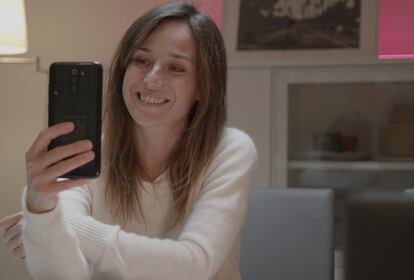The actress Marta Etura, in a frame from the documentary 'Like / dislike'.Funcas / Deer Watson Films
Says psychologist Julia Brailovskaia, from the Mental Health Research and Treatment Center of the Ruhr-Universität Bochum, that the smartphone and the rest of the internet access devices are “both a blessing and a curse”.
According to a report by the FAD Youth Foundation, it is a fundamental and daily communication tool (84.1%), information search (83.6%) and leisure (79.9%).
But, like any tool, it needs an instruction manual that, if ignored, can lead to stress, addiction, unreal images, frustration, loss of self-esteem, reduced physical activity, isolation and misinformation that conditions the world view and the decision making.
According to the experts who have participated in the documentary
Like / dislike
, produced by the economic and social research center Funcas and Deer Watson Films, the technology is there and the solution is not to ignore it, but to know how to use it.
Brailovskaia, lead author of a study in the
Journal of Experimental Psychology: Applied
, points out a first measure:
“It is not necessary to give up the mobile to feel better.
There should be optimal daily use.”
According to the results of this study, those who reduce their use by at least one hour a day register improvements in well-being.
But the reduction of the time of use is an obviously temporary, partial, insufficient and ineffective solution, since the use of the Internet is inalienable.
The most important thing is that, when it is used, it is known how it works and what effects it produces.
A team from Yale University published a study in
Science Advances
in which they identify a perverse mechanism of social networks by which, according to Molly Crockett, from the Department of Psychology and co-author of the work, "platforms reflect what is happening in society, but they also create incentives that change the way users react over time.”
In this way, the research reflects how networks can be a source for social good, motivating cooperation, stimulating change or promoting the recrimination of certain attitudes (such as machismo or xenophobia).
But it also, according to the authors, "has a dark side, contributing to the harassment of minority groups, the spread of misinformation and political polarization."
The perverse effect that it carries from one side to the other, according to this study, is based on the fact that users whose opinions are more shared or receive more "likes" are those with a less constructive discourse.
Users detect this bias, and according to Crockett, "moderate groups can become radicalized over time."
Another experiment along these lines, conducted by New York University and published in
Nature Communications
, simulated a social network and found that those who received more reactions tended to post more.
"Our findings may help to better understand why social networks dominate the daily lives of so many people, and may also provide clues for ways to tackle excessive behavior online," says
Björn
R
Lindström
, of the University of Amsterdam and lead author of the study. Article.
With these two experiments, the causes of the greater dependence on networks are anticipated and how this conditions what is published, which pursues more adhesions and reactions than conventional communication and even if it is not real.
In this sense, the actress Marta Etura, who has participated in the documentary
Like / dislike
without filters and with the most natural image, explains: “Social networks have a part that I don't like: showing only what is beautiful.
Society tends to classify feelings as good or bad, beautiful or ugly and invites us to create a parallel reality that is not real and can cause confusion when one is in a vulnerable place or is in a development phase, as is the case with teenagers”.
You can follow EL PAÍS TECNOLOGÍA on
and
or sign up here to receive our
weekly newsletter
.

